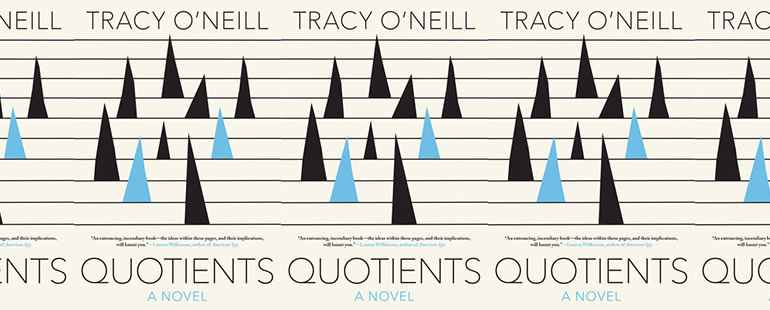Quotients by Tracy O’Neill

Quotients
Tracy O’Neill
SOHO Press | May 12, 2020
Does information protect or imprison us? Quotients, Tracy O’Neill’s highly-anticipated second novel—part suspense story, part relationship drama, and part commentary on the perils of our interconnected epoch—explores a world in which the truth is hard to determine and even harder to prove.
Jeremy Jordan, a former British covert operative in Belfast during the latter part of Northern Ireland conflicts in the 80s and 90s, now works as a social worker. Alexandra Chen is a brand consultant to countries and corporations—experienced in “how to sell a country on her selling their country.” The two meet in London in the mid-Aughts. Despite the commitments they make to each other to build an outwardly successful family, cracks appear. How far they are willing to go to protect their secrets—Jeremy’s buried intelligence past and Alexandra’s hidden quest for her lost brother—has consequences that ultimately challenge their identities, their family, and even their lives.
From the outset, O’Neill’s use of form—complex, sometimes disjointed language and short chapters—replicates the increasingly fragmented world of the protagonists, where “happenings were happening too fast.” Employing both abstract and concrete data—real-world events that subtly inform us of the passage of time interspersed with espionage double-speak and psychological, business lingo—O’Neill charges readers to decide what information to retain and which character to believe. That’s a distinct risk, but one that pays off for those willing to commit to the intricate universe the author has created. Equally compelling is O’Neill’s mastery of language, as much at ease writing codespeak—“‘Mum’s got a secret admirer,’ he said. Meaning: he was sure he was being followed ever since he’d started scratching away at the ties between Sinn Féin and Tyle,”—as she is writing near haikus on love: “There were freckles only on one cheek, inexplicable as love.”
Alexandra and Jeremy lead transactional and relatively untethered lives until the London Underground bombings of July 7, 2005 jumpstart their intimacy, as calamities often do. “(T)hey clutched, and they were alive, fortunately, wonderfully alive,” soon becoming each other’s port in the storm. O’Neill is an especially efficient writer, here distilling the couple’s growing intimacy in a few spare sentences: “Once, Alexandra would have on the occasion of bringing him flowers said she was bringing his house flowers. Less to lose then. Less frightening. Now, she asked, “Can we be trusted to raise a houseplant?” He brought home two kittens.” Or how in these three lines O’Neill expresses what some might need paragraphs to impart:
“One day, he tucked a note for her in a magazine: What does it feel like to make someone happy?
Don’t play stupid, she wrote in a cookbook. You know.”
Would Jeremy and Alexandra have deepened their relationship without the impetus of a national tragedy? Throughout the book, O’Neill encourages readers to question what holds us together as partners, lovers, siblings, friends, and if it can—or should—be sustainable for a lifetime. In Jeremy, Alexandra finds a stability that wasn’t evident in her life with her mother. Jeremy, through the shift in career and commitment to Alexandra and later, their child, attempts to create a life after—and perhaps even atone for—a past that involved treachery and death. With his loyalty to Alexandra—even after he becomes aware that she is keeping secrets—Jeremy is reforming and “re-forming” himself, in the same way he has revised his history to: “I was in the army at the end of the eighties, in Germany, and I went home.” One of the primary narratives of Quotients is that of a traditional spy thriller, whereby Jeremy’s past actions and loyalties in a time of war threaten the home he has created, the residue and paranoia of his former profession locate him as directly as a sharpshooter.
Alexandra, on the other hand, through her Quixotic pursuit of her brother Shel, loses sight of the present because of mislaid loyalties to correct the past. Alexandra’s professional confidence in diagnosing and creating new narratives for countries proves to be her downfall when it comes to her personal relationships. Is Shel a mentally ill conspiracy theorist or someone who is enmeshed in global seditions? she worries. “It had become clear that her brother was losing his mind …” Yet Alexandra keeps “trying to fit him with the image she’d carried so long,” unable release a childhood bond. “Because Shel was a person who had shared whispers with her… in whispers they had had a secret from their mother and from everyone else, and it was that they were better people than they looked…” If Alexandra gives up on this special bond that she and Shel shared then she is, in essence, admitting to a self-image built on a house of cards. In her unequivocal loyalty to her brother—something that isn’t expressly returned—she inadvertently suffocates the space in her heart for an equal loyalty to Jeremy.
Underlying these parallel plots is a polygonal exploration of the hazards of boundary-less interconnectivity. The literal and figurative aliases that the characters operate under speak to our own wide array of screen personae, the many stand-ins for different parts of ourselves we present to the world. O’Neill also references an impressive array of historical events and objects, though sometimes obliquely, often using acronyms and shorthand, many real but some only in the world of the novel. (For example, Cathexis bears a striking resemblance to a cross between Twitter and Reddit.) At times, attempting to keep these names and acronyms straight in the novel resembles the genuine struggle to keep track of all our own pseudonyms and passwords. At one point, Jeremy thinks, “In the panic of too much, you could lose your surroundings,” which is as true about this book as our lives in this highly-connected, overly data-driven world.
There is a special tyranny in seeking social media likes, believing that “a red dot was someone approving of some limb of a life . . .” that has shifted what it is to live in this automated, hollowly-connected time. One wonders if mankind is neurologically evolving away from its vestigial tail of traditional human connections, though yet unaware of it. More dangerous is how easily our exterior images crumble, revealing the rootless nature of our modern lives. Even Alexandra—the expert image manipulator, with “successes enunciating small former Soviet states still in spinout from the Cold War”—is subject to such pitfalls: “But it was also the way his virtuosic fear rattled the settled substrate of her life, upturned the glossy surface she had mastered, so that what was left was the halting thinness of a teenage self.” Ironically, in one of her work pitches, Alexandra extols “the hunger of real people for real people. In better looking people, consumers could see themselves,” when she is fighting that very realness in her own life. To be sure, Jeremy has his own blind spots, averring to his former colleague Wright that “we are not important enough to be followed . . . Only paranoid enough.” If those who forget history are doomed to repeat it, then in our interconnected time, those who believe in outer scaffolding more than inner may find that their identities are as two-dimensional as the HOLLYWOOD sign.
The title of O’Neill’s book is chosen well: she investigates the human condition as a mathematical theorem, exploring the results of dividing and compartmentalizing lives. What is the remainder, the indivisible quotient, when all external influences are silenced? Jeremy thinks: “It occurred to him that maybe his entire biography was only other people’s voices.” In the world of Cathexis that Alexandra finds herself scrolling through, there is “sentiment without eloquence, but sometimes they were stunning little quadrangles recording seaside champagne occasions or a mother’s recipe produced by her son . . .” or “people with addicts for daughters or alcoholics, and they would write ragged accounts of their hurt, tell each other they knew how it felt, they did because of their father or son.” But how much of any one person’s story should be known publicly? Does the constant condensation of resumés, cover stories, family milestones, and candidate soundbites ultimately diminish the realness of what is, like a photograph that has been enlarged so much that it loses definition? It’s this kind of human struggle that O’Neill captures, society’s experience of and opinions about the grasp of social media. There are shadowy overlords to be sure—the world of Jeremy and Wright, the agencies, named and otherwise, that Shel refers to, even the multinational corporations and countries Alexandra represents—but ultimately it’s the human frailties that we recognize and relate to.
Through prestidigitational language and structure, O’Neill smartly offers readers a similar experience as the protagonists, save the death threats and many-tentacled worldwide conspiracies. Jeremy, Alexandra, and the other characters may be maneuvered by a variety individuals and organizations, but we intake a similar firehose of information from and through them. Beyond conspiratorial thrills, this is a book about intimacy and loyalties yearned for and lost. At the outset, Jeremy thinks, “Signals: they were everywhere if you knew how to heed them.” Yet these individuals—we—are often unable to see through our faulty human screens of fears, illusions, and hopes, especially burdened by an increasingly fractional and artificial society. In Quotients, O’Neill tackles this blindness, and the result is a distinct, unconventional narrative with no easy conclusions.



